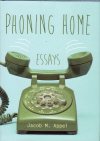Phoning Home
Phoning Home is a collection of essays by Jacob Appel, a prolific writer whose achievements in other disciplines such as medicine and bioethics provide him with a distinctive writer’s voice and acuity. The essays span the writer’s professional and personal lives, each adding depth and perception to the other. Essays on Appel’s Jewish heritage and family are at once poignant, witty and insightful. In “Mr. Odd and Mr. Even,” Appel profiles his maternal and paternal grandfathers, both in many ways polar opposites—one, a conformist and the other, someone who “made a point of sticking his neck out as far as his tiny, rounded shoulders would permit.” Who he should take after, Appel wonders. The rule breaker or the follower? In presenting their life stories in parallel, Appel marvels over the pull and push of familial bonds that mold us into who we are today.
In writing about his grandparents’ migration from Europe to America, Appel uncovers truths half-hidden in the fog of war and new beginnings. In the “Man Who Was Not My Grandfather,” Appel starts with a simple story about his grandfather receiving a letter in the mail from a woman whom he had taken out on a date many years ago. But remarkably, the story morphs into something more profound than just a love letter from an ancient flame. We also find out in the same story that his grandmother refused to marry a cousin, possibly bringing him and his family to the United States and escaping death at the hands of the Nazis. But that didn’t happen. She married his grandfather instead. These are the stories that remain untold, Appel says, the “holocaust narrative we rarely tell, the opposite of Anne Frank and Schindler’s List, the tale of those who make the sacrifices necessary to save the lives of others.”
As a practicing bioethicist, Appel is often confronted with situations that, while morally ambiguous, also demand an immediate and almost prescriptive response to matters of life and death. Appel presents these everyday dilemmas with a humility that belies his intellectual capacity, training and expertise. The essay titled “Opting Out” is about Appel’s role as a bioethicist in deciding whether or not doctors should reveal a cancer diagnosis to an aging woman whose daughter has forbidden them from doing so. This story of an old Russian cancer victim is an entry point into a thoughtful and informed deliberation on western societies’ seemingly conflicting value systems that, on one hand, support full disclosure (of a patient’s diagnosis to the patient), but on the other hand, support certain cultures’ rights that go against the mainstream—Christian Science followers’ refusal of antibiotics or Scientologists’ rejection of psychiatry being cases in point. In “Our Incredible Shrinking Discourse,” Appel laments the shrinking public space for debate and discourse in contemporary society. When people with opinions from the far right or far left of any issue speak up, their voices are drowned by the majority, whose rabble rousing, Appel argues, has the opposite effect of driving those with extreme views further out. Appel writes:
[I]ncreasingly we engage with only people who agree with us. Those who disagree are not merely mistaken-but downright evil. [ . . . ] When we forget that the underpinnings of our society are conscious choices, we become woefully unable to challenge those choices. We also become ill equipped to defend them.
In essay after essay, Appel holds the reader’s attention through a combination of wit, self-deprecation, wisdom, incisive knowledge and a deep sense of compassion and empathy for his fellow human beings. Phoning Home is a worthy addition to the pantheon of great American essays and Appel proves himself to be an astute observer and chronicler of the modern human condition.





